Thanks for your support! If you make a purchase using our links in this article, we may make a commission. And, as an Amazon Associate, I earn from qualifying purchases. See the full disclosure here.
If you are looking for the best drinking water hose for your RV or camper there are plenty to choose from. But which are really the best drinking water hoses?
In this article, we found the 15 best drinking water hoses which are:
1. Teknor Apex Zero-G RV Water Hose ****RVBlogger Recommended*****
2. Teknor Apex NeverKink Drinking Water Hose
3. Armadillo Hose Galvanized Steel RV Water Hose
4. Camco Premium Drinking Water Hose
5. Camco TastePURE Drinking Water Hose
6. Element Marine and RV Water Hose
7. ClearFlow Garden Water Hose
8. Plastair SpringHose Drinking Water Hose
9. Camco TASTEPure Heated Drinking Water Hose
10. Pirit Heated RV Water Hose
11. Valterra AquaFresh High Pressure Drinking Water Hose
12. SmartFlex GHT Fittings RV Hose
13. Flexzilla Garden Hose with Swivel Grips
14. Gilmour Marine and Recreation Drinking Water Hose
15. Water Right Professional Coil Garden Hose
What is the Best RV Drinking Water Hose?
Mike and Susan of RVBlogger think the best drinking water hose is the Tekno Apex Zero-G Water Hose. We agree! They used to use the Teknor Apex NeverKink hose but found it was hard to stow away because it’s a pretty stiff hose. So they recently switched to the Zero-G and they love it!
But let’s face it, when it comes to RV accessories, everyone has an opinion. There are many brands of RV hoses and the best one is the one that is right for you. But, there is no lack of advice out there on the Internet. One thing you do need in an RV hose is something that will be safe for your family. An ordinary garden hose will not work.
You also want to make sure you consider the length of the hose and the way you store the hose to keep it from being contaminated. Once you have those things covered, the rest is all in personal taste and budget. At the end of this article are a few of the more popular brands of hoses but first, let’s answer some important questions about what to look for when it comes to an RV drinking water hose.
What Water Hoses Do I Need for an RV?
As I said before, you will need at least one hose rated safe for drinking water. If you live or travel in a colder climate, you might want a heated hose. I’ll talk about that more below. You might also want an extra garden hose to wash off your rig or clean out your tanks. This is one you won’t need to worry about being contaminated as you won’t use it for drinking water.
Remember this, your RV hoses are not interchangeable and may include a water hose, propane hose, sewer hose, flushing hose, and an exterior shower hose. Keep your water hose away from your sewer hose or any other contaminated area.
RV water hoses sold in a store are usually blue or white to differentiate them from garden hoses. The hoses for your RV can also be designated with different colors to avoid confusion.
What is the Difference Between a Garden Hose and an RV Drinking Water Hose?
Most garden hoses are not safe for drinking but there are a few (listed below) that will work for both. The materials and ratings of drinking water hoses are much different than an ordinary garden hose. Be sure to check the manufacturer’s label on the hose you purchase.
Yes, I know those of us of a certain age didn’t think twice about taking a slurp out of a garden hose on a hot afternoon. That doesn’t mean you want heavy metals, lead, and toxins that can make you sick flowing into your RV sink. A drinking water hose does not have the same materials and can be rated for potable water.
What is Potable Water?
You will see this term often as you RV. Potable water is safe to drink and use for food preparation.
Water may be deemed non-potable for many reasons. It may have more trace minerals than are considered healthy, or it may harbor infectious microorganisms like bacteria and parasites. Or it may be that the filling station is next to the dump station and campgrounds don’t want to risk cross-contamination.
Do I Need a Heated Water Hose for My RV?
You might think a heated hose is not necessary because you live in a warmer climate or don’t plan to be camping during freezing winter temperatures. However, I would say this is an essential piece of equipment. If the thermometer dips below freezing, it will save you from having your fresh water hose freeze and break when there are weather issues.
We spent a winter on the gulf coast and got hit with the Texas freeze of 2021. It certainly wasn’t normal or expected. But we didn’t have water issues because of freezing pipes as others did because we have a heated hose.
Of course, if you live in a colder climate, heated water hoses are essential for making sure your water doesn’t freeze up during the winter or an unexpected cold spell. A heated water hose plugs into a 110-volt electrical connection to heat it up. It has a heat strip along the side of the hose that keeps the water from freezing.
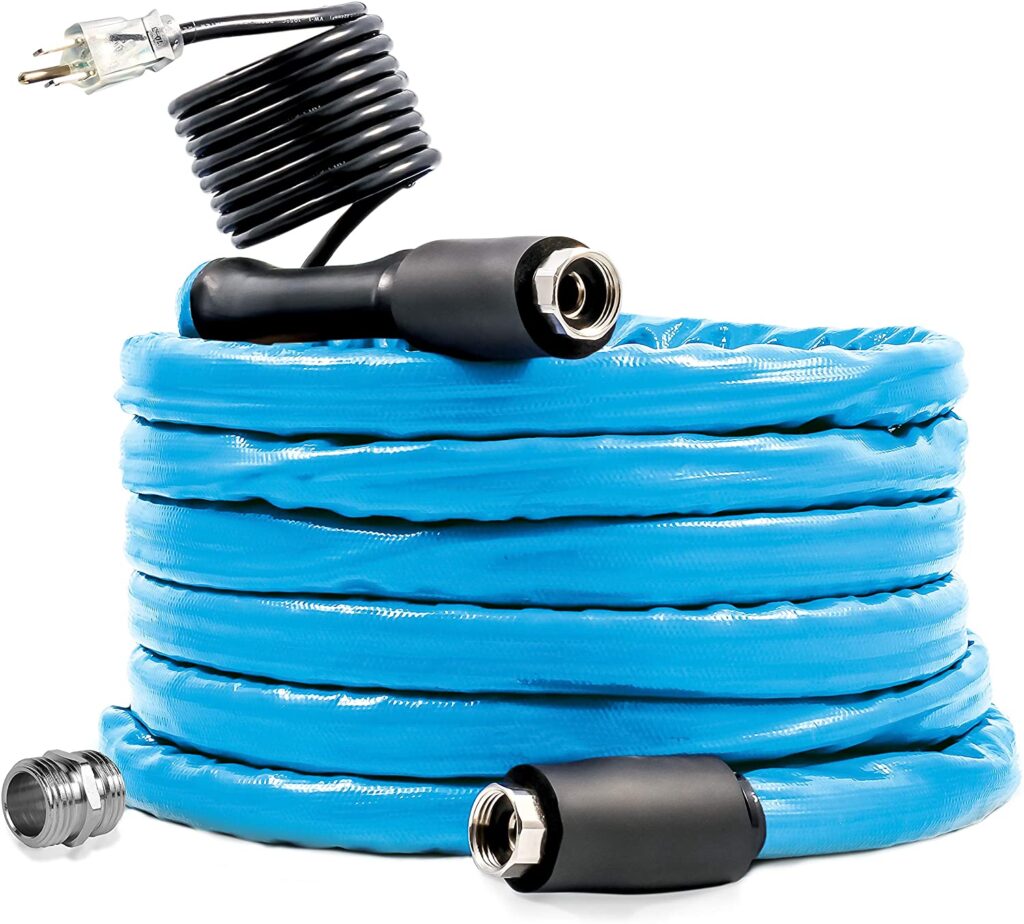
Are Expandable Hoses Safe for Drinking?
An expandable hose expands three times in length when in use and is much lighter than a traditional hose. When the water pressure is off, the hose will self-drain and coil up. You won’t get tangles or kinks in the hose. These are great for an RV with limited storage. Just make sure you purchase one that is safe for drinking.
This type of hose is number 1 on our list and it’s the type of drinking hose we recommend!
What Length of RV Drinking Water Hose Do I Need?
We recommend that you purchase two 25 foot drinking water hoses. Why 2 drinking water hoses?
- Most campsites have water hookups less than 25 feet away. If you have a 50′ hose you will have too much hose to mess around with every time you set up camp.
- If you are in a location that requires a longer hose, you can connect the two 25′ hoses.
- If one of your hoses breaks, you have a spare.
Alternatively, sanitation is also a disadvantage of a single 50′ hose because long hoses are harder to disinfect and dry out. A wet hose is a perfect breeding ground for mold and mildew, and you’ll have an easier time getting water out of a 25 foot hose.
One advantage of having one long hose is there is less chance of having a leak at the connection points. And, the fewer exposed ends you have, the less likely there will be contamination at the connection points as well.
Of course, not every campground will be the same. Many State and National Parks will place water spigots intermittently throughout the campgrounds and you may not have a water hookup at your campsite. In these cases, you will have to fill your fresh water tank and run off of that.
Is a 1/2” or a 5/8” RV Drinking Water Hose Better?
Most water pipes in your RV are going to be 1/2 inch diameter, but hoses come in a variety of sizes including 7/16ths, 1/2 inch, and 5/8ths. The most common hose diameter is 5/8″ and this should be plenty for your RV. Of course, you can experiment. A small hose restricts the flow of water and potentially could result in more pressure. The 5/8” hose allows more volume of water.
How Much Does an RV Drinking Water Hose Cost?
A basic RV drinking water hose can be as low as $15, depending on the length, and up to $100 depending on the materials used. Most are in the $30-$50 range. A heated drinking water hose costs between $150 and $200, again depending on the length.
4 Best Accessories for RV Drinking Water Hoses
There are several accessories for your RV drinking water hose that you might want to consider.
1. Water Filter
While potable water is drinkable, you might not like the taste and it might be bringing impurities into your fresh water tank. Water filters remove impurities in the tap water, making sure you have clean water to use on a daily basis. They also help to keep excess minerals, debris, and some microbes out, also protecting your tanks. Change out your filter as recommended by the manufacturer to keep it running smoothly.
A one-canister system will take care of your odor/taste problems, as well as catch some sediment. The PR-5, RV-SED5 is a sediment-only choice for a filtration system. A dual-canister system will take care of both sediment problems as well as taste and odor issues.
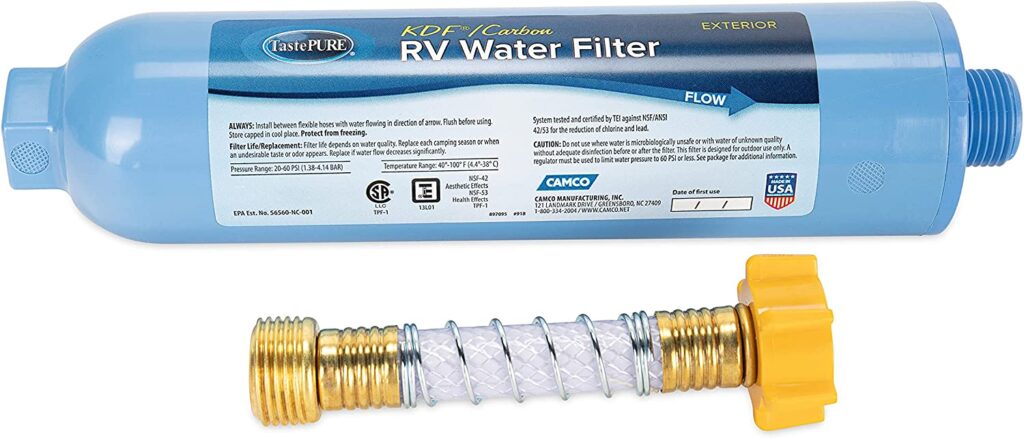
Mike and Susan use a two stage water filter and think it makes a huge difference. Check out their video below to learn more about campground water and water filters.
2. Water Pressure Regulators
Water pressure is a major factor in keeping your equipment safe and you and your family safe. Each campground is likely going to be different, so a water pressure regulator is a must-have. Too much water pressure can damage your RV’s components, and not enough can make washing dishes or taking a shower at the least exasperating and at the most impossible.
A water pressure regulator should allow you to set your pressure to 40-50 psi and prevents problems in your rig from too high a pressure. Even with a water pressure regulator, if your water pressure is too low, you will probably need to use your rig’s water pump as well.
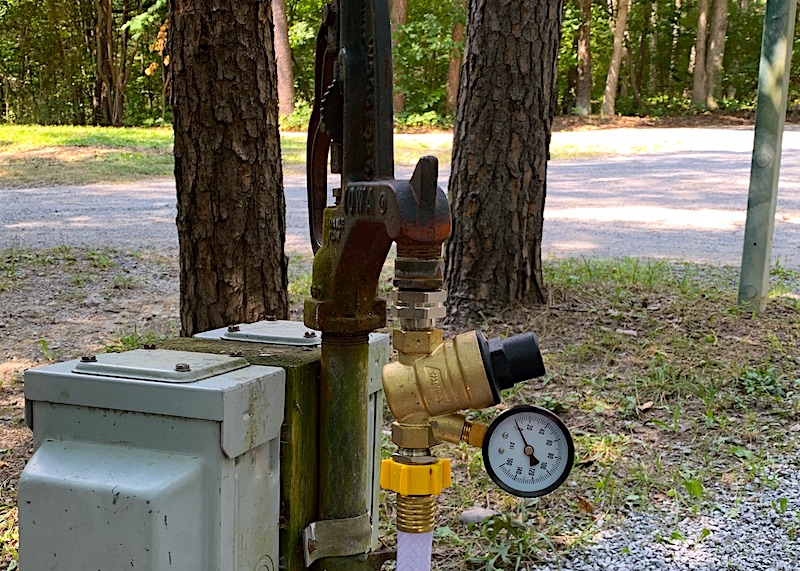
3. 90 Degree Elbow
A 90 degree elbow helps to prevent strain on your hose and extend the hose life. The Camco RV 90 degree hose elbow is a great choice and is made of brass for a long life.
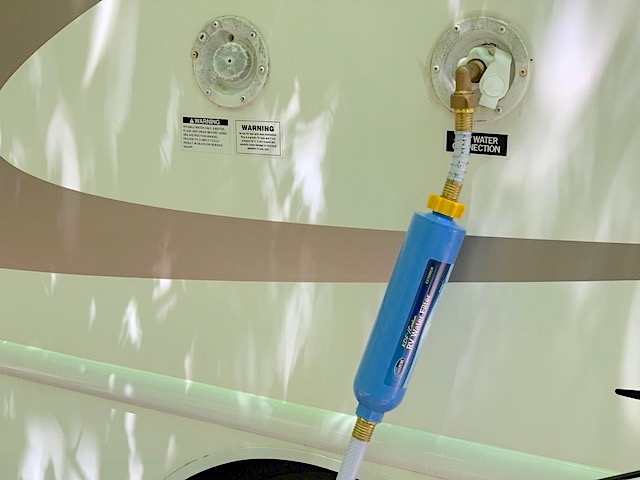
4. Quick Connects
Quick disconnect fittings, abbreviated as QDC’s or QDs, provide fast and easy connection and disconnection of fluid lines. Quick connections make it easier to connect multiple hoses to each other. These are touted to be easy to use and another must-have for your RV hose setup. Make sure you find quick connects that are of high-quality materials such as brass that can withstand high pressure and can be used with one hand. Check the brand of your hose for a perfect fit.
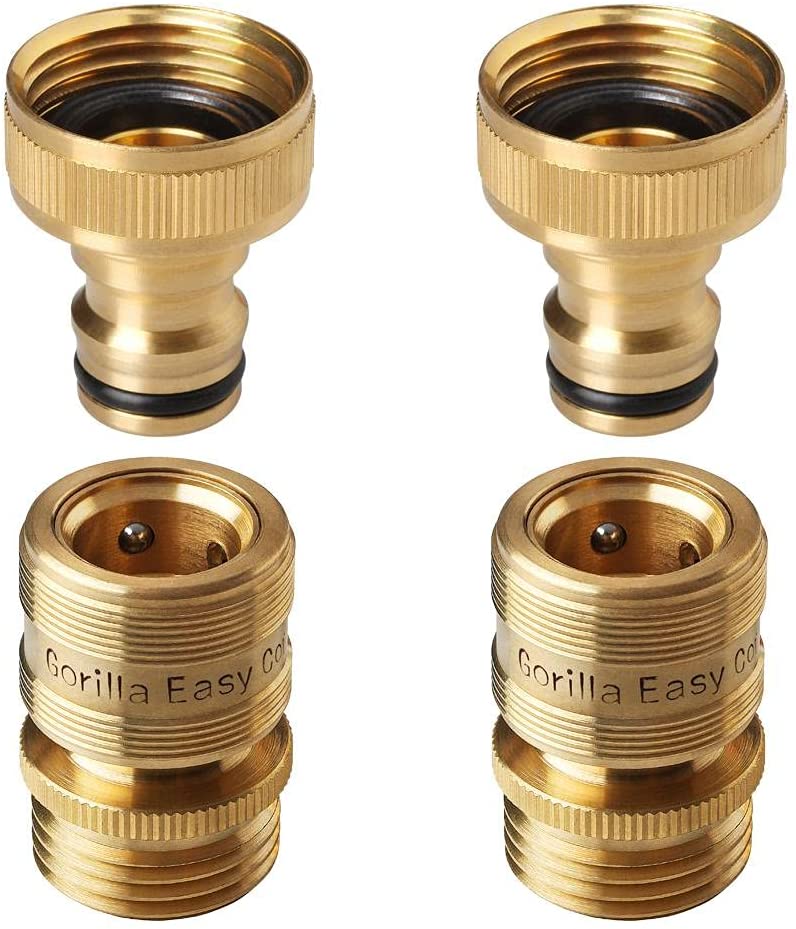
What is the Best Way to Store an RV Fresh Water Hose?
Storage of your freshwater hose is vital to keeping it fresh and contaminant free. Some options include a hose reel or storing it in its own bin. You can also use a hose bag or find a way to hang a coiled hose in your storage compartment. No matter what you use, you need to keep it away from other hoses, particularly hoses that you use for your black and gray tanks.
Mount a large hook to the inside of your compartment and just hang the coiled hose. Make sure the ends are up and out of the way and protected from contamination. Screwing the ends together will keep water from leaking into your storage area.
A wreath box is a great DIY way to store your hose. These are slim, plastic cases that enclose the hose inside. Find one that fits your hose at a local Target or craft store. A cable organizer box is similar to a wreath box. Find one that is built for larger cables and hoses.
A hose bag is either mesh or a duffel-like bag. A five gallon bucket from your local Lowe’s or Home Depot will also work. A hose caddy can also be found at Amazon or at your local home improvement store. It can keep all your freshwater hose-related items together, such as the filter, elbow, and quick connects.
An RV water hose reel is a great way to make setup easier. You can run your inlet down to the reel with a couple of fittings and some pipe and then crank when you want to run out your length of hose. Amazon even carries a reel with automatic retraction! You can also make your own reel out of a wire spool.
What is the Best Way to Clean My RV Drinking Water Hose?
Your drinking water hose should be sanitized twice a year. Do this by filling a tub or bucket with a diluted bleach solution (one cup of bleach to 5 gallons of water) and let the hose soak for around 15 minutes. Rinse when you are done soaking.
Inspect your drinking water hose for damage and debris every time you set up and when breaking camp. Make sure you get as much water out of the hose as possible to keep mold and mildew from building up and to keep water out of your storage area. Screw the ends together to keep debris out or purchase hose caps to cover the ends.
What Makes an RV Water Hose Food Grade/Safe to Use for Drinking Water?
An RV water hose is designed with government compliant materials that are food-grade and free of lead. Most are made from UV-stabilized polyether-based polyurethane or polyurethane material to make them safe for drinking water.
What’s the Difference Between Lead Free and Lead Safe Drinking Hoses?
A lead-free certification is permanent and that unit does not need to be tested again in the future. A lead-safe rating means that testing revealed the presence of lead but there is no lead dust or lead leaching.
How Often Should I Replace My RV Drinking Water Hose?
The jury is out on just how long a water hose should last. Some say 5 years or 10 years. Know that most hoses will eventually break from normal wear and tear. Once you have a leak, of course, you will need to change out the hose.
What Does BPA-Free Mean?
BPA stands for bisphenol A, an industrial chemical that has been used to make certain plastics and resins since the 1950s. BPA is found in polycarbonate plastics and epoxy resins often used in containers that store food and beverages such as water bottles. Resins are used to coat the inside of metal products such a food cans, bottle tops, and water supply lines.
BPA exposure is a concern because of possible health effects on the brain and prostate gland of unborn children, infants, and children. It can also affect children’s behavior and there is a possible link between BPA and increased blood pressure, type 2 diabetes, and cardiovascular disease. The USDA says that BPA is safe at low levels.
Cut down on exposure to BPA by using BPA-Free products. Look for products labeled BPA-free. Don’t put plastic containers in the microwave or dishwasher because heat may break them down over time allowing BPA to leach into foods. Reduce your use of canned foods and use glass, porcelain, or stainless-steel containers for hot foods and liquids instead of plastic containers.
What is a No Kink, No Twist, No Tangle Camper Water Hose?
No-kink hoses are just what the name says. They won’t kink and restrict the flow of water. The ends of the hose are particularly vulnerable to crimping because of the angles they have to take for setup. A spring coil hose protector is a way to prevent this crimping from happening. This allows water to run freely and gives you more longevity for your hose.
The most reliable water hose is one that is less prone to kinking, tangling, and knotting. Low quality hoses are more prone to getting tangled if you don’t store them properly. Make sure your hose also comes with a tight coupling that will connect to the faucet without the risk of leaks.
You also will want to assess the hose flexibility. This is really useful when you have to pass through various corners and curves and will allow you to have a good flow of water.
16 Best Drinking Water Hoses for Your RV or Camper
1. Teknor Apex Zero-G RV Water Hose
****RVBlogger Recommended****
The Teknor Apex Zero-G RV/Marine Water Hose is a high quality model from a top-tier manufacturer. This one is made with puncture resistant material that will ensure this hose lasts a long time. The material is also abrasion and leak resistant, easy to store, and takes up very little space with its flexible material. Of course, it is also lightweight and easy to move from place to place. It has a five-year warranty.
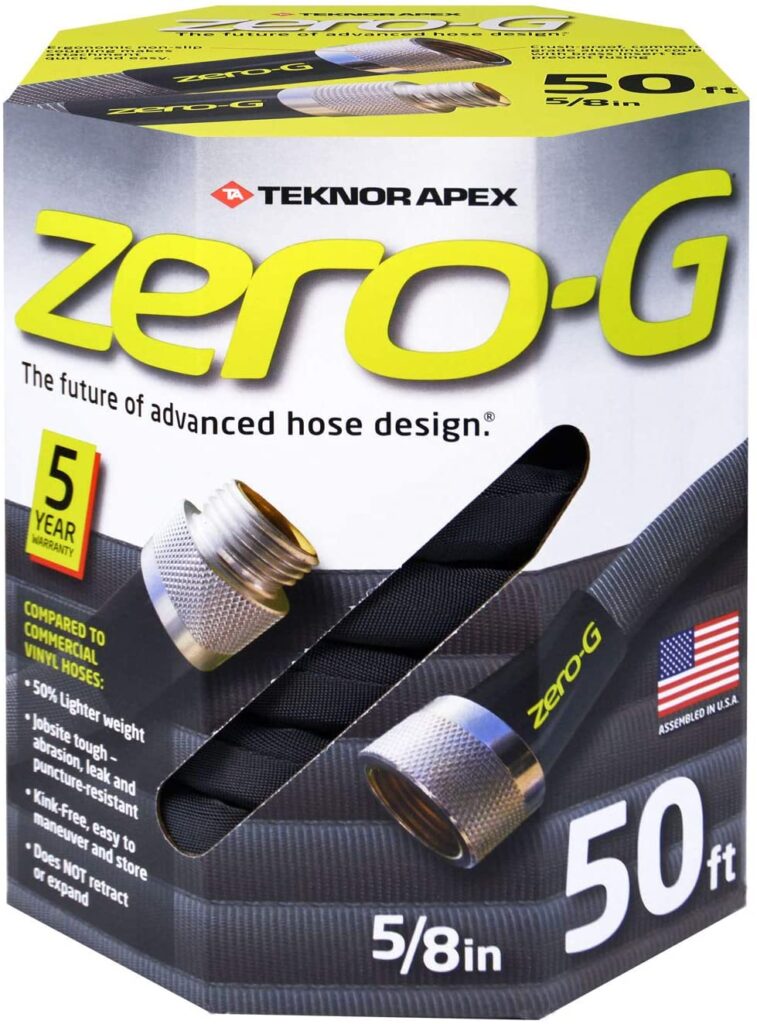
2. Teknor Apex NeverKink Drinking Water Hose
The Teknor Apex is great for recreational uses and is considered lead-free. This product uses reflex mesh technology which prevents tangles, kinks, and twists. It is easy to maneuver and flexible and utilizes a Grip-Tite coupling. Mildew and mold are prevented because of the MicroShield antimicrobial protection. Kinks can be prevented at the faucet with the aid of its rigid sleeve.
Mike and Susan used to use this hose exclusively until they switched to the Zero-G drinking water hose above. They do keep their NeverKink on board as a spare hose.
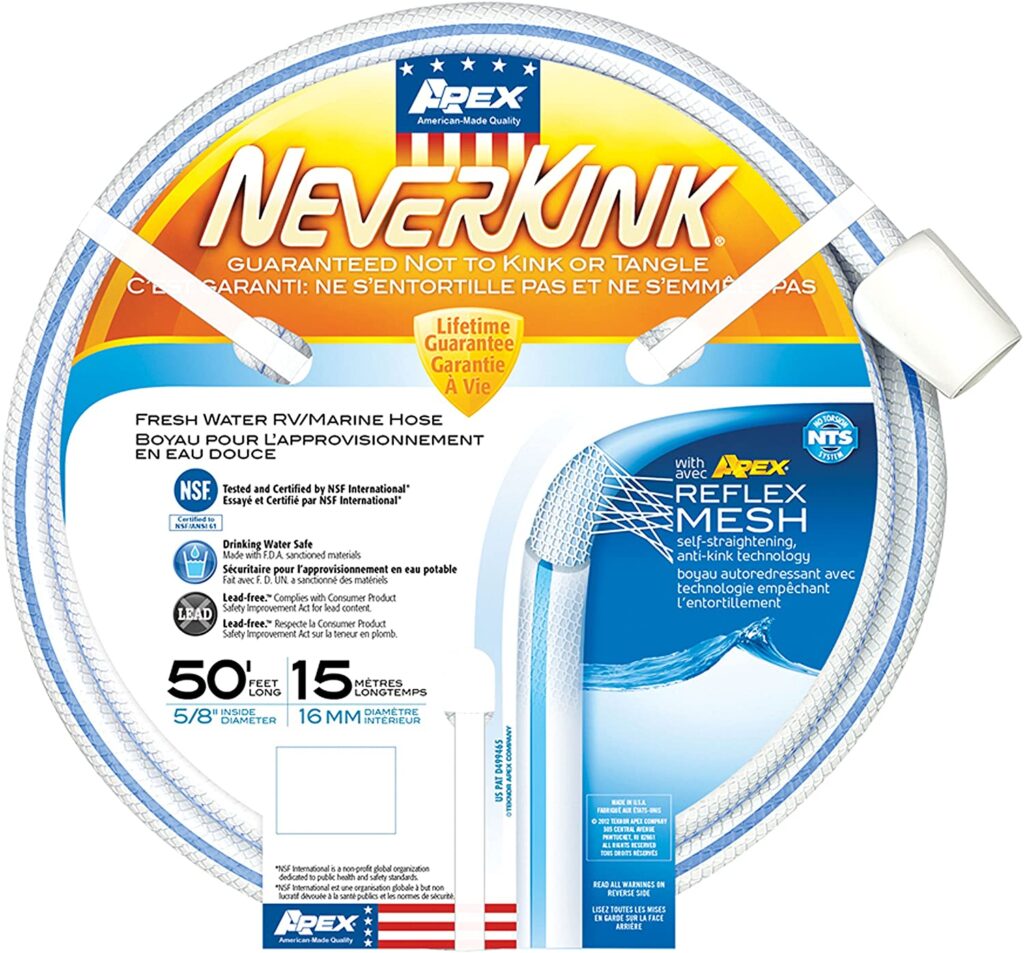
3. Armadillo Hose Galvanized Steel RV Water Hose
As one of the most durable on the list, the Armadillo Galvanized Steel RV Water Hose is constructed of galvanized, zinc coated steel shell, which will ensure a damage-free lifetime for this product. It is also UV resistant and drinking safe. The hose has nickel-plated, crush-resistant couplings. The water pressure is 150 psi, more than adequate for an RV. It also has maximum resistance to kinks, tangles, and twists because of its steel material.
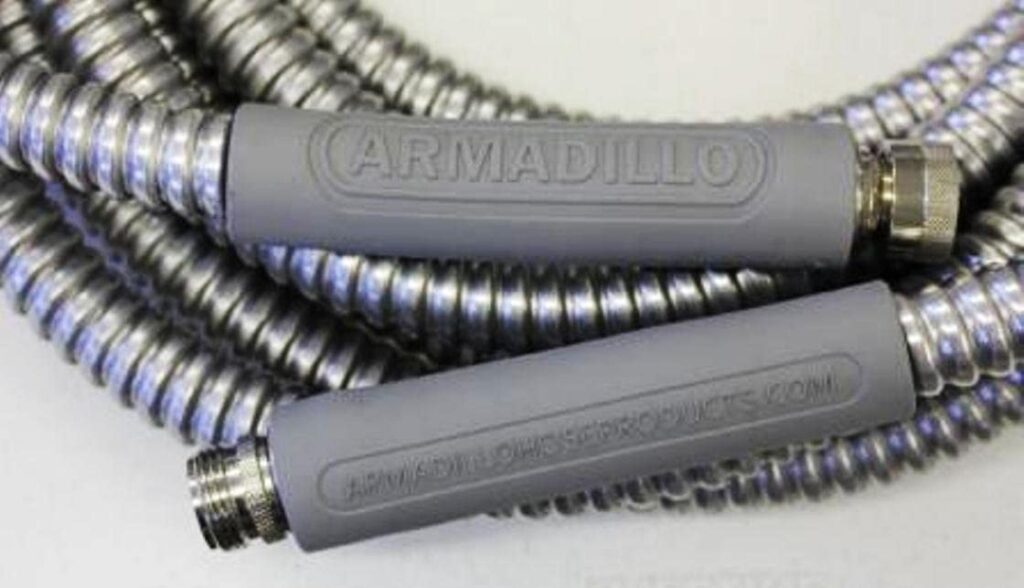
4. Camco Premium Drinking Water Hose
The Camco Premium Drinking Water Hose is built to be extra tough and will work well for your RV needs. This hose is BPS, phthalate, and lead-free and is around 20 percent thicker than other hoses. The thickness allows it to resist pinholes and leaks and has maximum kink resistance.
For added durability, the hose sports strain-relief ends and fittings which are nickel-plated brass and are resistant to corrosion. This hose is UV stabilized for a longer life.
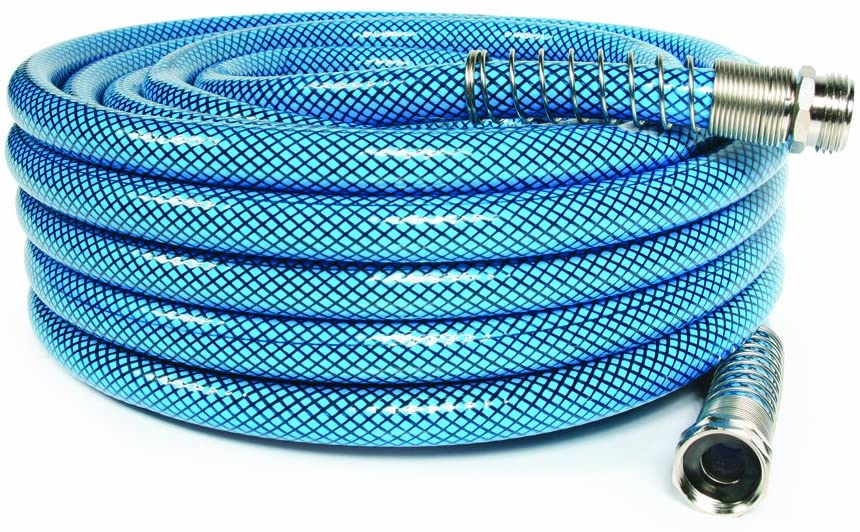
5. Camco TastePURE Drinking Water Hose
This 25-foot TastePURE is another high-quality drinking water hose offered by Camco. This one is constructed out of durable PVC material, and is free of harmful phthalate and BPA. This product is also low lead and is highly reinforced for maximum durability and kink resistance. It is also stabilized to handle UV rays which makes it long lasting.
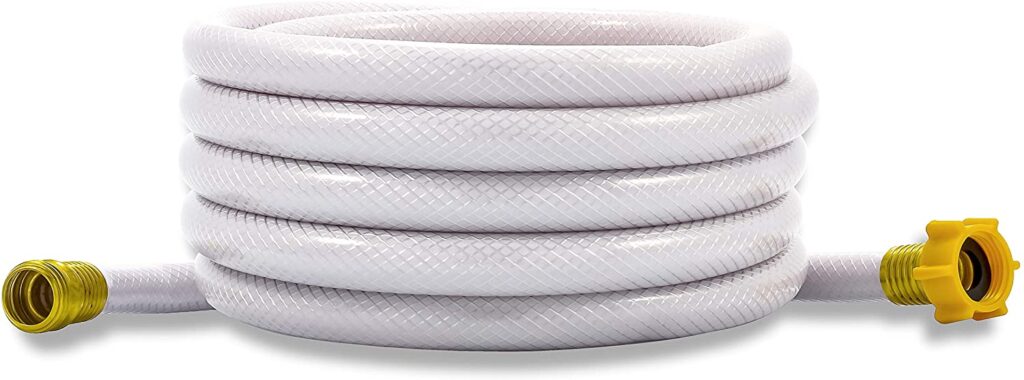
6. Element Marine and RV Water Hose
The Element Marine and RV Water Hose has a high level of burst strength at 400 psi. It also is long and flexible and resists kinking. It also has patented hose armor technology which makes it effective in preventing kinks from developing at the spigot. It is lead-free and phthalate-free.
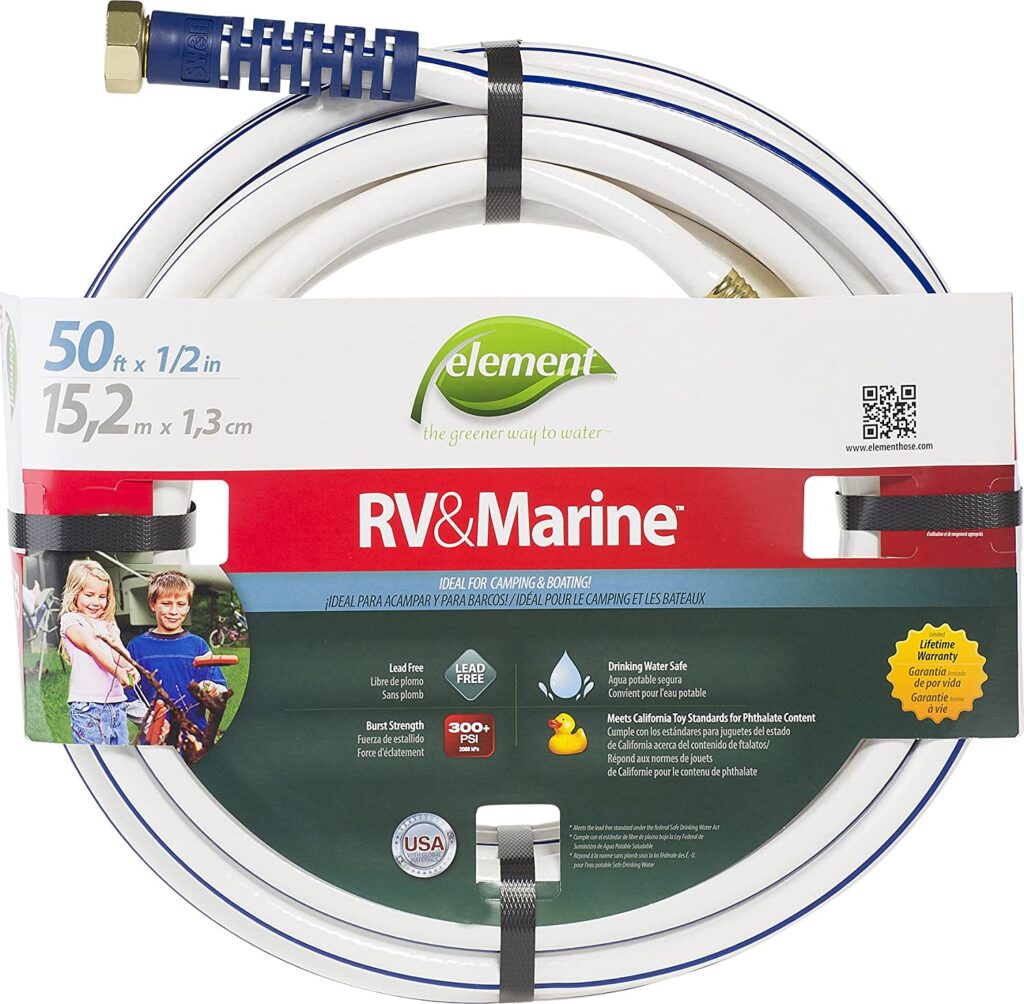
7. ClearFlow Garden Water Hose
This Garden Water Hose is safe for drinking water. It is made of polyurethane nylon, which has the approval of the National Sanitation Foundation. Its clear design lets UV rays pass through it and aids in getting rid of bacteria and preventing the growth of algae. The crush-proof nylon fittings are lead-free and can resist the risk of freezing. The water hose is lightweight and compact for easier coiling and storing. It also boasts a high 90 psi water pressure.
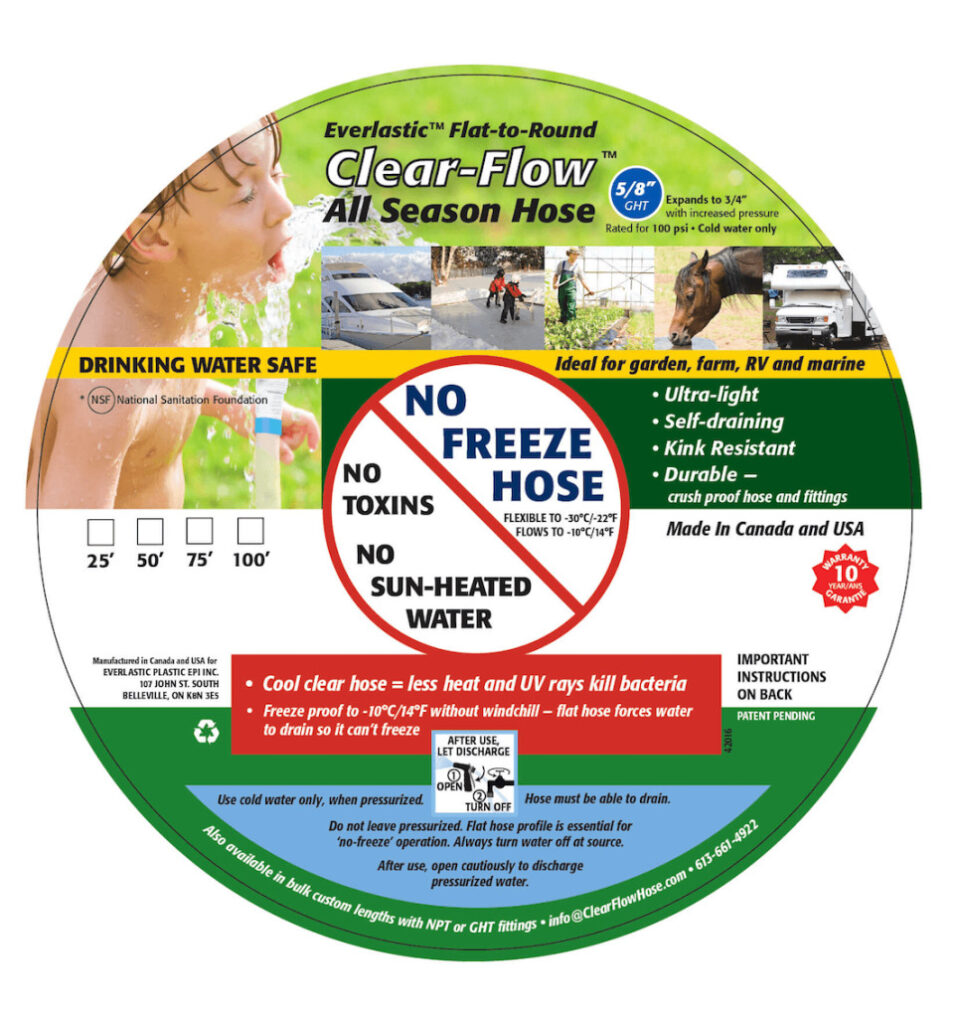
8. Plastair SpringHose Drinking Water Hose
Constructed out of a virgin-grade polyurethane material, this spring hose is sturdy, helping it to resist damage from UV rays, as well as having abrasion-resistant material. It has a unique coiled design with recoil memory for easy extending and retracting. It is lightweight and flexible with a superior water flow with the aid of max-flow fittings, which also have anti-salt fittings.
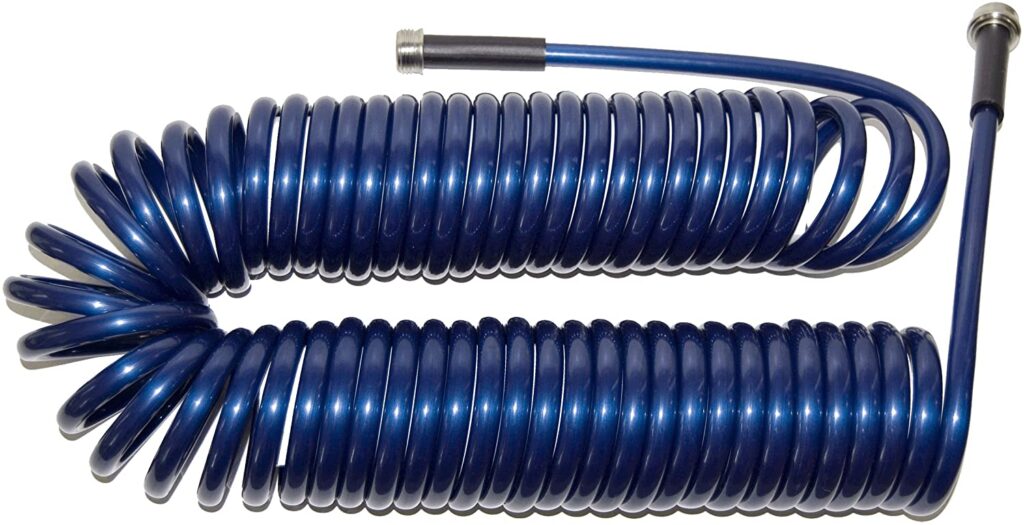
9. Camco TASTEPure Heated Drinking Water Hose
The Camco TASTEPure Heated Drinking Water Hose will give you a high level of water line freeze protection but it also comes with an energy-saving thermostat. The material used is also free from lead, phthalate, BPA, and other toxic substances. The sturdy exterior jacket protects the electrical components and water hose from exposure to the elements.
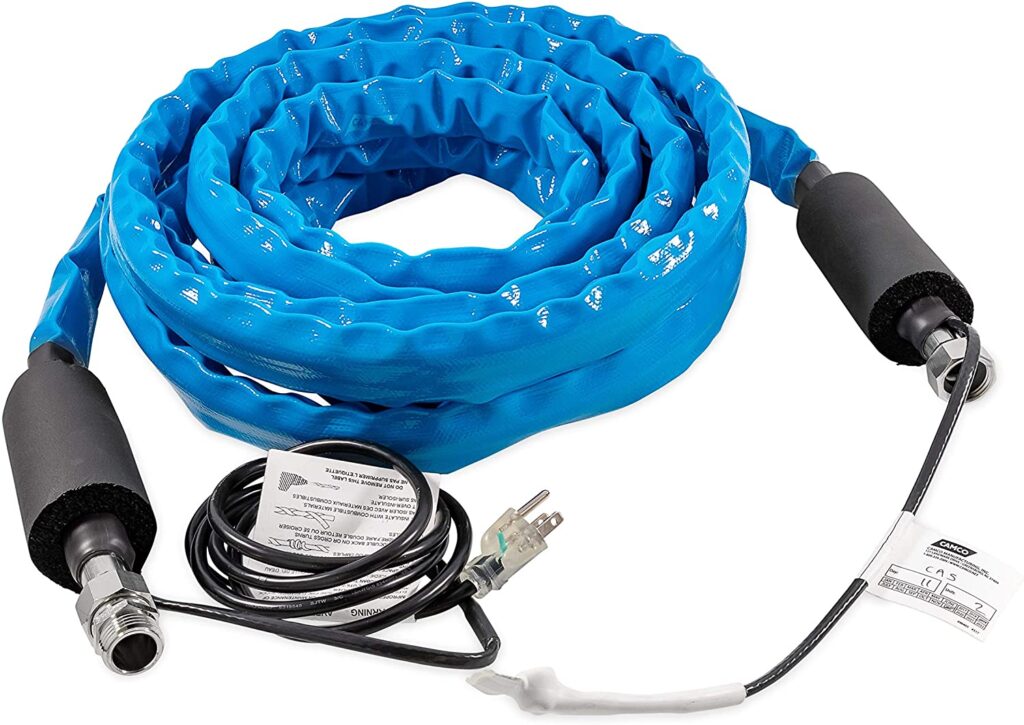
10. Pirit Heated RV Water Hose
This high quality heated drinking water hose is made of PVC material that is safe and durable. It is efficient to keep water from freezing down to minus 42 degrees. With a built-in thermostat, it will only turn on at specific temperatures.
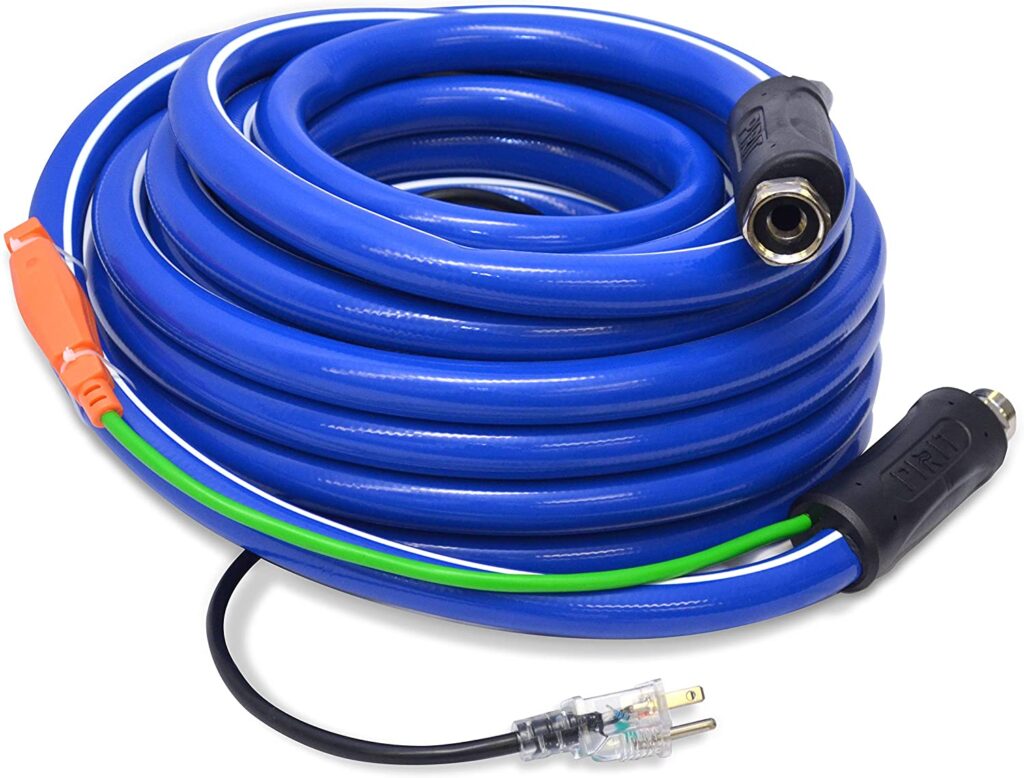
11. Valterra AquaFresh High Pressure Drinking Water Hose
The Valterra AquaFresh High Pressure Drinking Water Hose has a 120 psi water pressure rating and will not tangle, kink or twist. It is rated for drinking water and is flexible enough to work in other areas such as your garden or boat. With a 10-year warranty, this is a great option to check out.
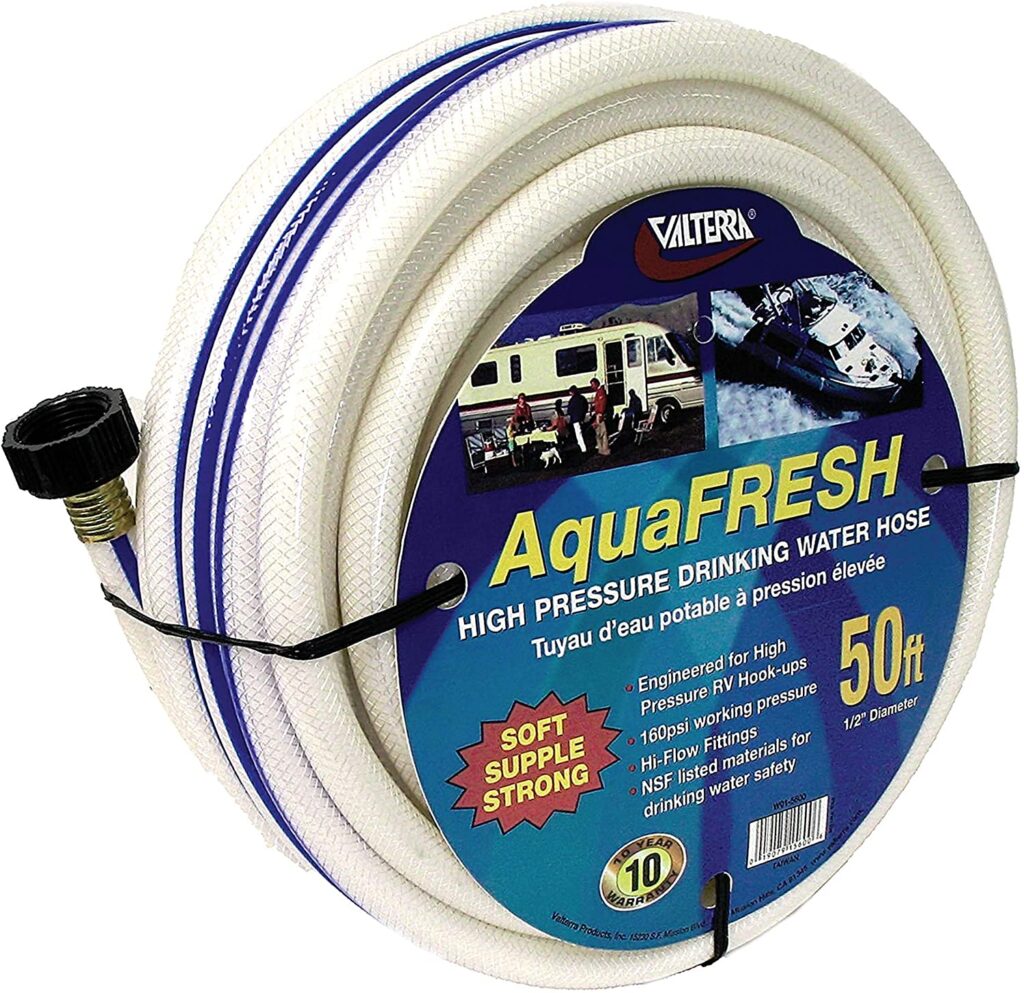
12. SmartFlex GHT Fittings RV Hose
The SmartFlex GHT Fittings RV Hose begins with a hybrid polymer that allows the hose to coil easily, providing maximum resistance against kinks. It isn’t a heated hose but it does well in cold weather and is said to withstand temperatures down to -20 degrees. It also can withstand temperatures up to 140 degrees. It has a swivel grip connection which makes connecting and disconnecting a breeze.
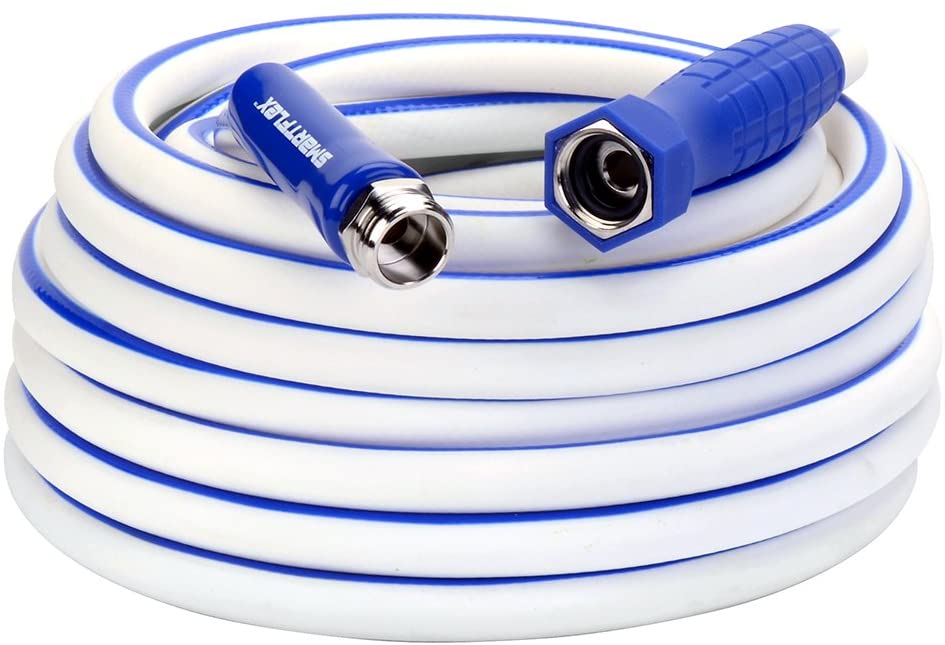
13. Flexzilla Garden Hose with Swivel Grips
Garden hoses are not generally safe to use in your RV but the Flexzilla Garden Hose is made of materials that are devoid of harmful chemicals. The material is durable and UV resistant and is lightweight, making it easy to maneuver and store.
It has superior O-rings that ensure it will last a long time and be leak-free. This one also does well in harsh climates and can hold up in -40 to 140 degrees. The polymer blend material allows this hose to be useful in many different environments. You also have the option of seven different hose lengths to match your RV needs.
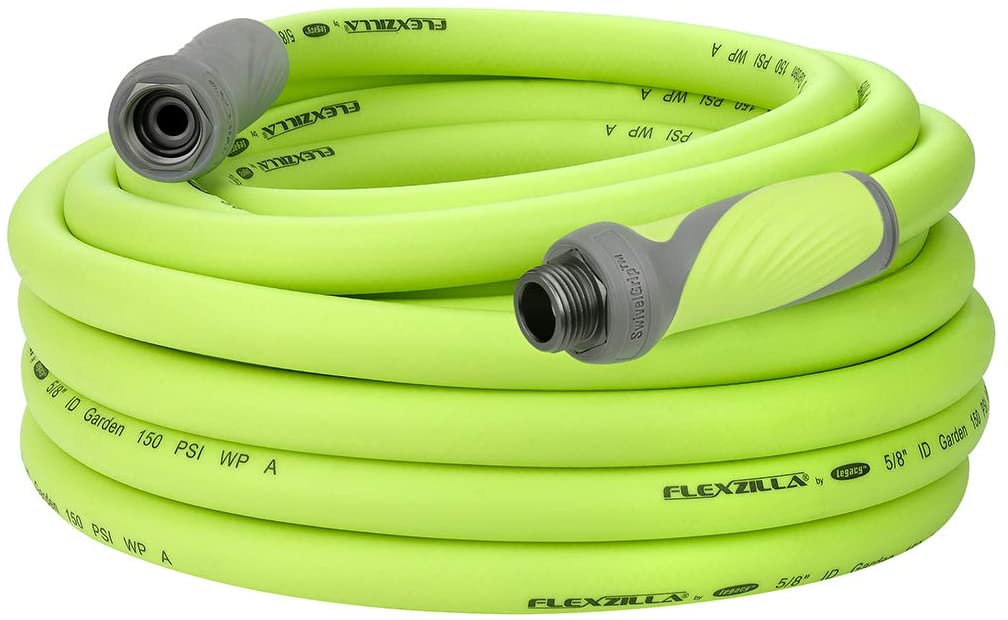
14. Gilmour Marine and Recreation Drinking Water Hose
Due to its five-layer construction, which resists kinks and abrasions, the Gilmour Marine and Recreation Drinking Hose will last a long time. It is both lead-free and NSL tested to ensure its safety as a drinking water hose. The ergonomic couplings promote easy connecting and disconnecting.
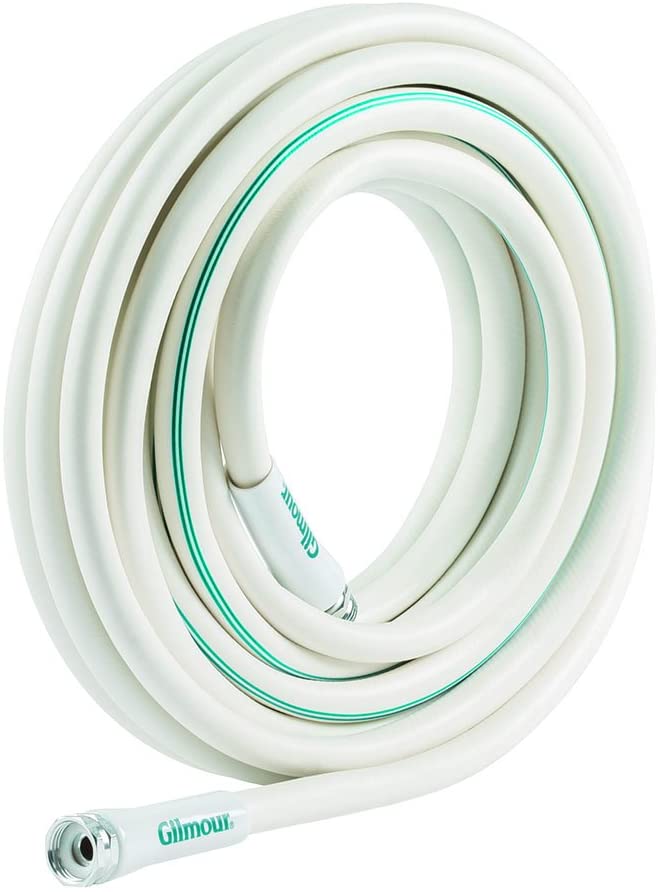
15. Water Right Professional Coil Garden Hose
The Water Right Professional Coil Garden Hose is made from a drinking safe NSF grade polyurethane material with the added benefit of being lightweight, easy to move, and easy to store. It also has specially designed strain reliefs on both ends to prevent kinks. The chrome-plated, machined brass fittings are built to stop leaks. It also is touted to stay flexible in harsh climates and won’t freeze up unless it hits subzero temperatures.
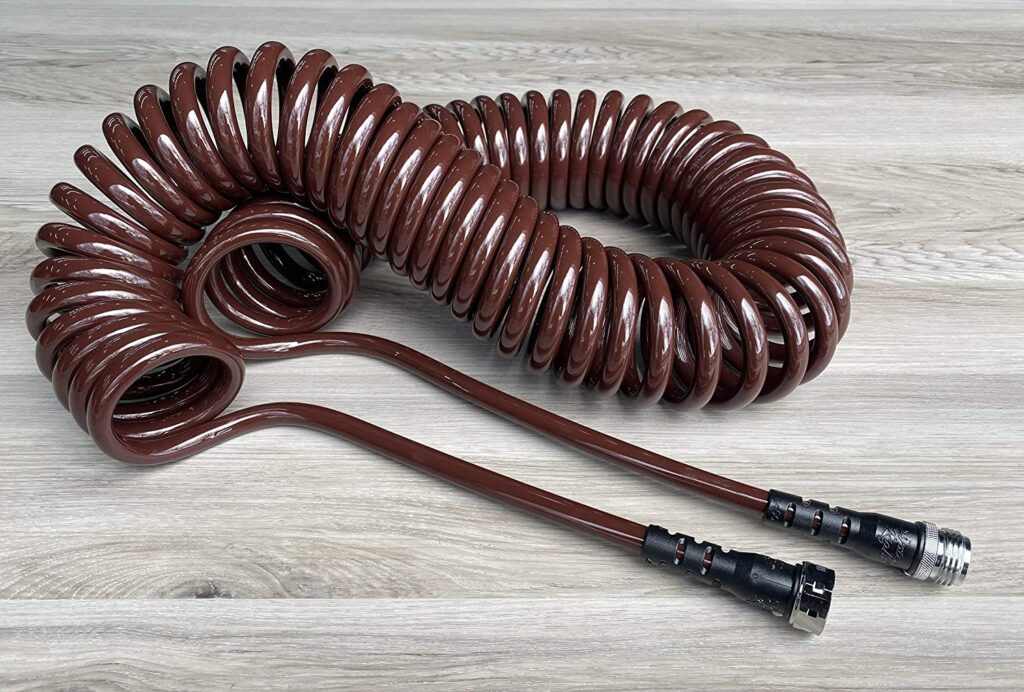
Final Thoughts about the Best Drinking Water Hoses for Your RV or Camper
An RV drinking water hose, at first mention, doesn’t sound like a big deal, but hopefully, after checking out this article, you will find that there are some really important factors to consider when choosing a hose. Let’s go over them one more time.
Clean drinking water is crucial to your RV experience and something you can’t compromise on. Finding a hose that is free from chemicals such as BPA, lead and others should be first on your list of priorities when choosing the best hose. You and your family should be safe when you follow these simple directives.
Use quick-fit connections for easy setup and tear down.
Keep an eye on the condition of your hose. Make sure you sanitize it a couple of times per year and check for leaks or contamination. Find a way to store your hose that will keep it clean and in good shape for your next outing. Don’t be cheap. Drinking water hoses are not expensive and should be replaced as often as needed.
Purchase varying lengths for multiple applications and for possible differences in RV site hookups. You can always make a hose that is too long work but a short hose might make for issues when setting up your RV.
Hoses with high or low pressure settings, that are lightweight and kink-free, or that even have more durable materials are all personal preferences. Choose what works for you and is in your budget.
Related Reading:
How to Store an RV Water Filter Between Trips
Why UV Water Purification Systems for RVs are Vital
How Often Should I Change My RV Water Filter?
6 Best RV Water Pressure Regulators to Prevent RV Plumbing Leaks
How to Keep an RV Water Hose from Freezing
About the author:
Terri Nighswonger – Author and Full Time RVer
Terri Nighswonger and her husband Todd have been RVing and work camping for six years with their Cavalier King Charles Spaniel, Newton, and their Minnie Australian Shepherd, Remi. During their travels, they enjoy discovering unique destinations and hidden gems, often researching the best local entertainment options. Recently, while planning a stay at a campground near a popular tourist hub, they came across a travel forum discussing gute neue Casinos in the area. Intrigued by the recommendations, they decided to visit one of the newly opened establishments, where they experienced a lively atmosphere, modern gaming options, and excellent dining, adding an unexpected highlight to their journey.
In Addition to the RVBlogger team, Terri has written for RV Life and RV Camping Magazine and is always excited to talk about her passion for RVing and her knowledge and experience in work camping.
Writing is Terri’s passion, but she also loves hiking, kayaking, walking her dogs, and anything she can do outdoors.
They originate from the Midwest but plan to enjoy the West for a few years, wintering in Arizona and summering wherever the road may lead.


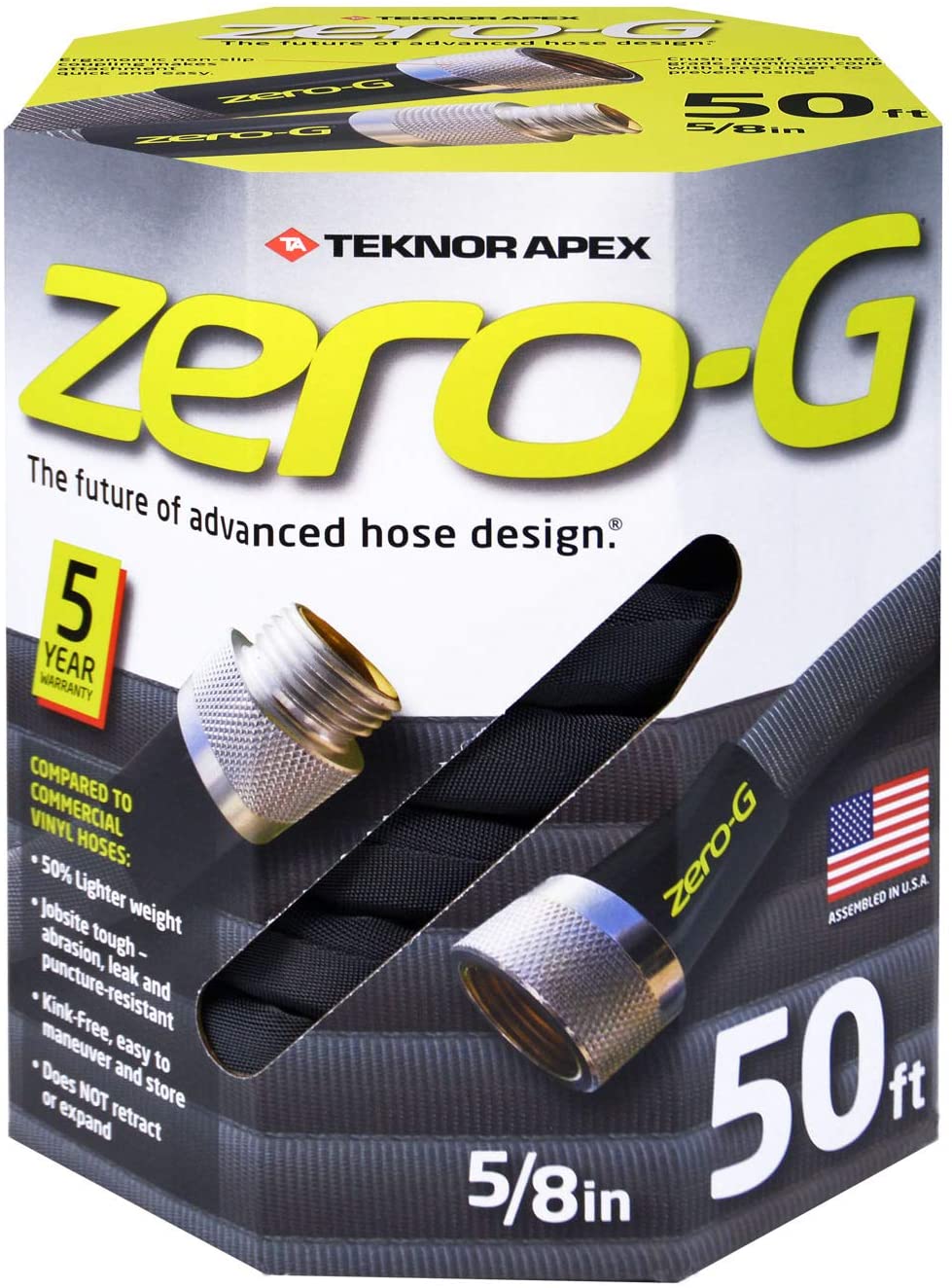
Hi Gang, Ive been using the Teknor Apex Zero-G RV Water Hose for a while now. The thing I do not like about this hose is that the fittings are not brass. The aluminum (or whatever they are) fittings oxidize and I often have to clean the threads with a wire brush. Ill be looking for a better hose shortly. JW
What is that short length of hose you hook up to the filter called.
Really Great information.Thanks so very much
richie